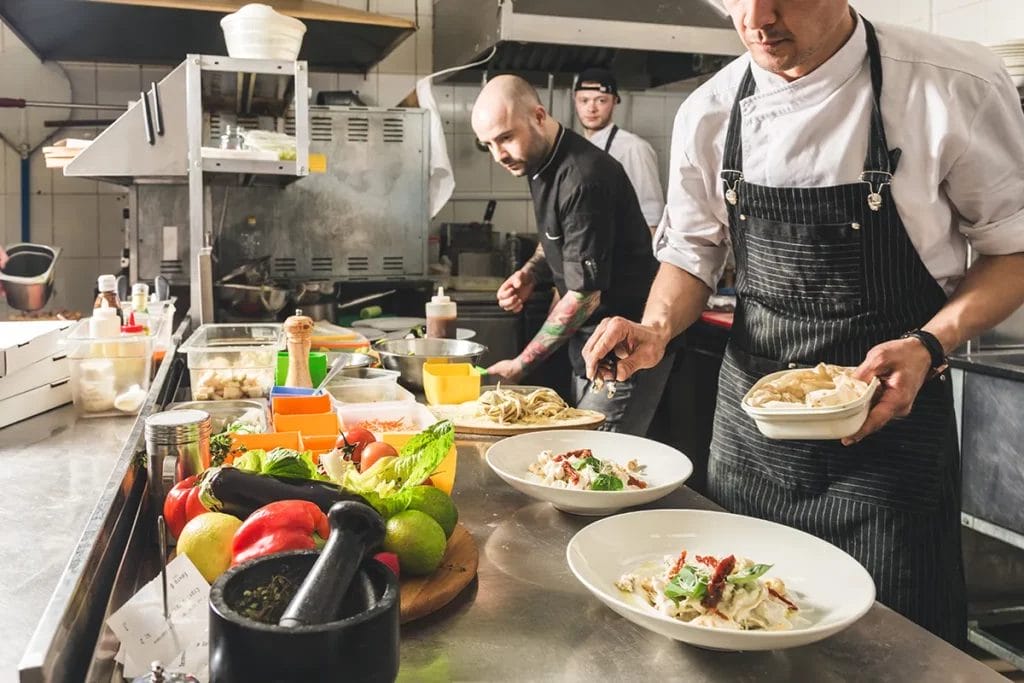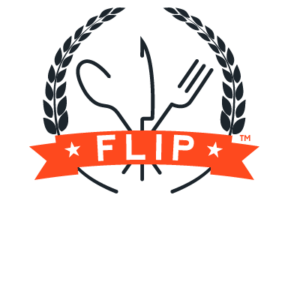The commercial kitchen industry is growing and evolving rapidly, with food entrepreneurs and kitchen operators facing unique challenges and opportunities in the space.
To help both types of business owners navigate these changes, Food Liability Insurance Program (FLIP) hosted a virtual live event with industry experts Ashley Colpaart (Founder and CEO of The Food Corridor) and Kyle Jude (FLIP Program Manager at Veracity Insurance Solutions).
Host Kyle Porter guided the panelists through a discussion, providing valuable insights for aspiring and established business owners ready to scale their businesses safely and sustainably.
Understanding the Commercial Kitchen Landscape
Commercial kitchens go by many names, often referred to as commissaries or shared-use kitchens. The panel began with a brief discussion of what shared-use kitchens are and the different types that exist today.
“When we say shared-use kitchen, we say that as an umbrella term for a physical production space that’s rented out to multiple tenants,” said Colpaart. The terms commercial kitchen, shared-use kitchen, and commissary are typically used interchangeably.
She noted that several types of facilities fall under this umbrella, including kitchens catering to one specific type of business (such as food truck commissaries) and incubator kitchens. The latter are commercial kitchens that provide access to services and coaching to help renters grow their businesses.
Across the board, shared-use kitchens are becoming increasingly popular thanks to consumer demand for locally-made food and beverage products and a post-COVID increase in small- to mid-sized food businesses.
“People really do care about where their food is coming from and want to support local businesses,” said Colpaart.
Choosing a Shared-Use Kitchen for Your Business
Colpaart advised businesses looking for the perfect commercial kitchen to pay attention to a few factors:
- Location: According to Colpaart, most business owners “want something close to home” to help keep expenses low and maximize convenience. She recommends using The Kitchen Door (a subset of The Food Corridor) to find facilities in your zip code.
- Cleanliness: Colpaart also emphasized the importance of working with a kitchen that takes food safety seriously because your commercial kitchen’s hygiene standards directly impact your own.
- Communication: Find a kitchen operator who is available and responsive to your needs. It’s crucial to set up strong lines of communication early on and keep them open in case problems arise.
When asked what a commercial kitchen operator might look for in a prospective renter, Colpaart shared they typically ask for the following:
- Your business plan
- Proof of your business license
- Your certificate of insurance
- Your food handler’s card
- How many hours you want to rent per month
- What your rental budget is
Colpaart also shared that there are typically two types of rental agreements you may enter into with a commercial kitchen. The first is drop-in, meaning the kitchen allows you to book space by the hour throughout the month, while the second requires you to commit to a certain number of hours each month.
In this second type of agreement, you pay upfront for a minimum number of hours. Any hours you book beyond the minimum will cost you an hourly rate.

Why Commercial Kitchen Operators and Renters Need Insurance
Commercial kitchen renters and operators need comprehensive insurance policies to shield themselves from the financial impact of claims. To illustrate this, Jude shared the story of one FLIP policyholder who rented a commercial kitchen for their business.
The tilt skillet in the kitchen had not been properly maintained and exploded, severely burning several employees. This resulted in a $1,000,000 payout for the policyholder. Because they were insured, this claim was covered. If they had been uninsured, they would’ve had to pay this expense out of pocket.
Jude described the coverage needs of both renters and operators as fairly similar. He emphasized that general liability insurance is universally needed, as all businesses are at risk for third-party bodily injury and property damage claims.
After general liability, the types of coverage you need depend on how your business operates.
For example, if you have employees, workers compensation insurance is required in nearly all states. If you own a commercial kitchen that does copacking or you are a food manufacturer operating in a shared-use kitchen, product recall insurance is another must-have.
“No single individual policy will cover you for everything,” said Jude, noting that package policies exist to address this issue. They combine multiple types of coverages that certain businesses need into one package.
For example, FLIP’s commercial kitchen insurance bundles general and product liability because they are two coverages all renters need.
“Think about it as a patchwork,” Colpaart added, describing the various policies your business needs as the layers you need to fully cover your business from the claims you’re likely to face.
Jude also advised business owners to speak with an agent if they need help determining exactly which coverages their business needs.
Q&A and Final Thoughts From Panelists
At the end of the webinar, Jude and Colpaart took live questions from the audience and shared their final thoughts with all attendees.
Jude congratulated business owners looking for a commercial kitchen to help scale their growing business, but acknowledged growth can be intimidating. “Always reach out for help — don’t be afraid to,” he urged entrepreneurs, stressing that insurance agents are the best resource to help you assess your needs.
“The thing about the food industry that’s special, that’s different from any other industry, is that food is relational at its core… we break bread together and we share meals together,” said Colpaart, acknowledging the tremendous role food plays in our lives. “Focusing on your local community and building your brand locally is the way to go.”
For more details and expert advice, watch the full webinar! Plus, discover how FLIP can help support your business goals and protect your entrepreneurial future with our top-rated commercial kitchen package policy.

Alex Hastings
Seattle-based copywriter and (WA) licensed insurance agent Alex Hastings leverages her experience as a lover of fast-casual food, baked goods, and iced oat milk lattes. She holds a B.A. in Creative Writing from Western Washington University. Before working at Veracity, she was a retail copywriter at Zulily and an English language teacher in South Korea. Alex is fully trained on FLIP insurance coverages and writes content that connects food and beverage business owners with the policies they need.
Seattle-based copywriter and (WA) licensed insurance agent Alex Hastings leverages her experience as a lover of fast-casual food, baked goods, and iced oat milk lattes. She holds a B.A. in Creative Writing from Western Washington University. Before working at Veracity, she was a retail copywriter at Zulily and an English language teacher in South Korea. Alex is fully trained on FLIP insurance coverages and writes content that connects food and beverage business owners with the policies they need.


